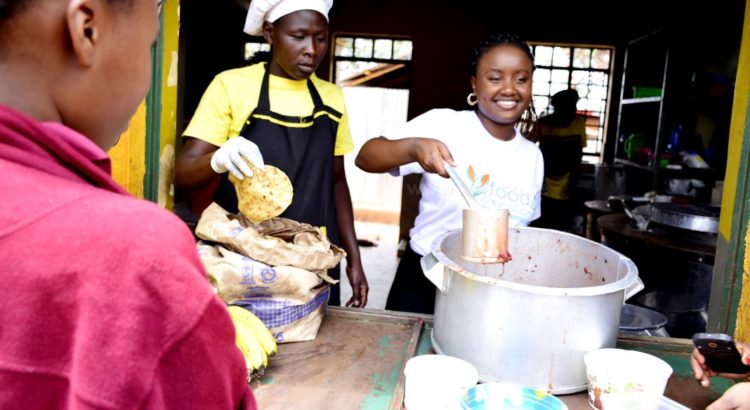Posted By: bethnyaga
“Ordinary men earn responsibility towards their family; extraordinary men earn duty towards their nation”
Photos by Jackson Mnyamwezi
This quote by Amit Kalantri ran through my mind while I interacted with Wawira Njiru, the founder and Executive Director of Food 4 Education.
Wawira is not your typical 28 year old. At this age, she has already found her calling which is to help the school going children who cannot afford your average meal per day.

HER CALLING IS TO HELP THE SCHOOL GOING CHILDREN
Her campaign to feed school going children has been progressive and last year got a boost in the arm after it received global recognition from Cisco and a cash prize of KSh. 25M.

GLOBAL CITIZEN AND CISCO JOINED TOGETHER IN A UNIQUE PARTNERSHIP TO CREATE THE GLOBAL CITIZEN PRIZE: CISCO YOUTH LEADERSHIP AWARD
Global Citizen and Cisco joined together in a unique partnership to create the Global Citizen Prize: Cisco Youth Leadership Award to highlight the significant contributions made by young people around the world in achieving humanity’s common goals.

“I MAY BE YOUNG, BUT MY MIND IS OLD,”
The prize, awarded for the first time in 2018, honours one young change-maker helping to create a better world for all, every year.
As Wawira took us through her day to day life while feeding the children, she was collected which prompted me to ask her how she can be so out there and still so young…. This is what she had to say… “I may be young, but my mind is old,” she said amidst laughter.
“Food 4 Education is not just feeding the kids but giving them dignified, nutritious meals,” says Francine Katsoudas the Executive Vice President and Chief People Officer Cisco.

Wawira has so far employed 35 employees from the community who help her achieve her goal of feeding the 10,000 children.
As the children from Ruiru Primary school were being served lunch, I couldn’t help but notice a wrist band which was donned by all the students.

“FOOD 4 EDUCATION IS NOT JUST FEEDING THE KIDS BUT GIVING THEM DIGNIFIED, NUTRITIOUS MEALS”
“Tap2Eat is a digital mobile platform that uses cutting edge FinTech to enable public primary school children access nutritious food for education,” explains Wawira.
Parents pay Ksh 15 for the subsidized lunches using mobile money. The amount is credited to a virtual wallet linked to an NFC smart wrist band which students use to then Tap2Eat in under 5 seconds.
The meals are cheap because of international and domestic grants and donations.

“TAP2EAT IS A DIGITAL MOBILE PLATFORM THAT USES CUTTING EDGE FINTECH TO ENABLE PUBLIC PRIMARY SCHOOL CHILDREN ACCESS NUTRITIOUS FOOD FOR EDUCATION,”
How it works
Food 4 Education has four head chefs and eight assistant chefs working around the clock to prepare enough food for thousands of children.
The kitchen only hires locally and partners with local farmers who supply their crops, which enables community members to earn more income. At the moment, the organization has one kitchen.
Every day, the kitchen loads up a truck with vats of cooked food. The truck then makes rounds to 11 different partnering schools in Kenya to deliver lunch by 12:40 p.m
Video courtesy: food4education.org
Source and Image: https://www.kbc.co.ke/why-wawira-njirus-food-4-education-is-making-international-headlines/











 Users Today : 111
Users Today : 111 Total Users : 35460128
Total Users : 35460128 Views Today : 146
Views Today : 146 Total views : 3418777
Total views : 3418777